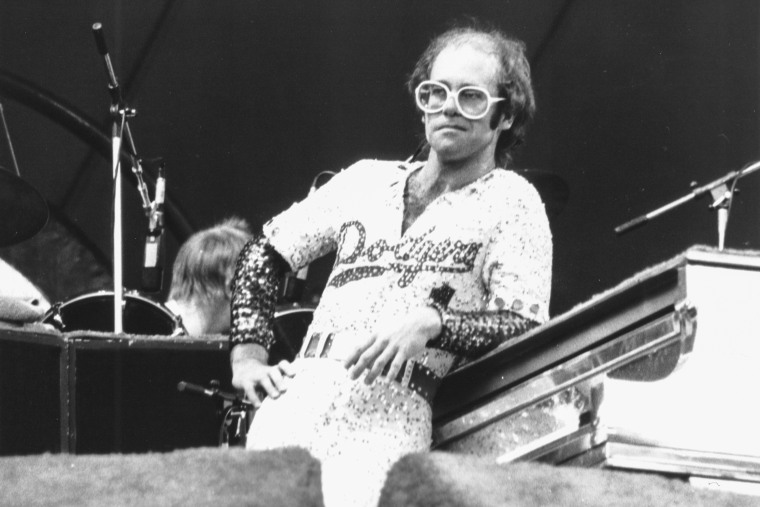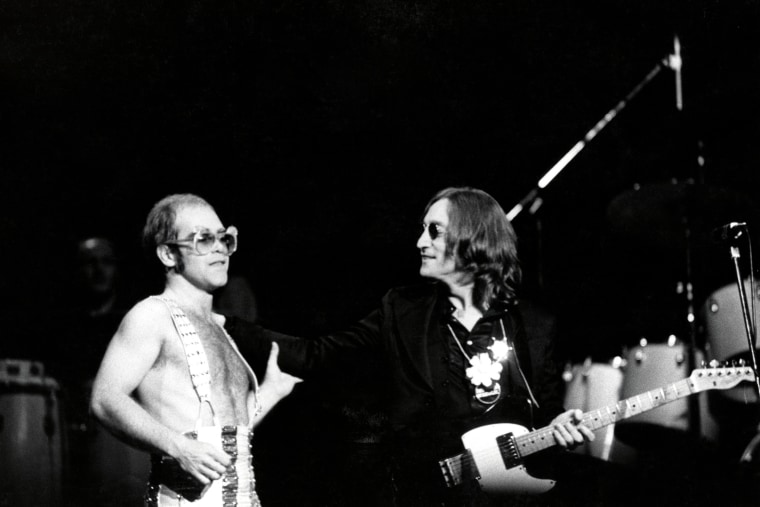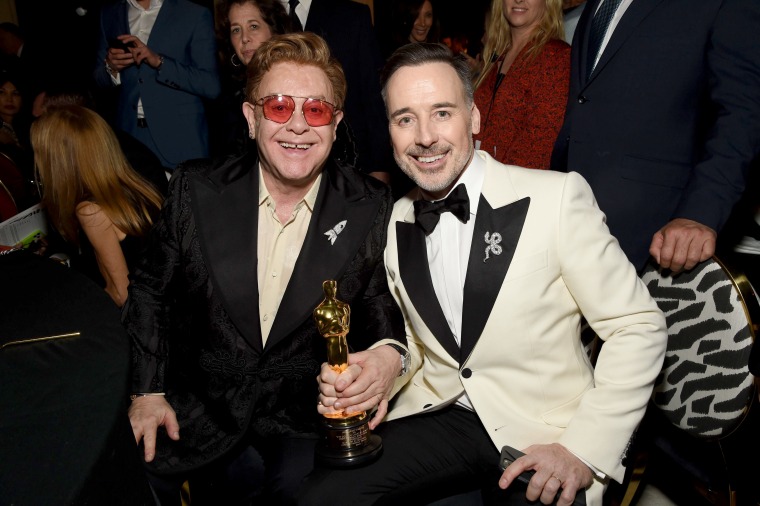In October 1975, a 28-year-old Elton John performed two sold-out shows at Dodger Stadium in Los Angeles, cementing his status as the biggest pop star in the world. Nearly 50 years later, John returned to the scene of his crowning achievement to perform his last-ever US shows as part of his wildly lucrative Farewell Yellow Brick Road tour.
Those two seminal events in the iconic singer-songwriter’s life form the foundation of “Elton John: Never Too Late,” now playing in select theaters and debuting Dec. 13 on Disney+. Directed by RJ Cutler and John’s husband, David Furnish, the documentary juxtaposes the months leading up to John’s final concert in North America with the early years of his career, including the remarkable five-year period, between 1970 and 1975, when he released 13 albums — seven of which reached No. 1 — and redefined rock ‘n’ roll.
In 2018, John announced that, following a multiyear global tour, he would be retiring from his life on the road, citing a desire to spend more time with Furnish and their two children. Knowing that his husband, who regularly performed 90 to 100 shows a year, was about to give up “a huge part of who he is and how he kept his music alive” for good, Furnish — who has been John’s partner for 31 years and is the CEO of their artist management group, Rocket Entertainment — wanted to find a way to commemorate the milestone.

In early 2020, Furnish took a meeting with Cutler, an accomplished documentarian best known for his revealing portraits of Billie Eilish, Bill Clinton’s first presidential campaign and, most recently, Martha Stewart. While Furnish had his sights set on capturing the historical and emotional significance of John’s farewell tour, Cutler expressed an interest in revisiting the first five years of John’s career, which culminated in another monumental event: his decision to come out in a 1976 interview with Rolling Stone journalist Cliff Jahr.
“When we started talking about the resonances between those two decisions and the way in which they reflected on the kind of life that Elton has chosen to lead, we realized there were big themes here to make a film around this extraordinary character who defined his own “life courageously and didn’t let life define him,” Cutler told NBC News in a joint interview with Furnish. “Life is finite, but you live the life you choose to live and it’s never too late to make those decisions.”
Cutler — who vividly remembers being in the audience at John’s show at Madison Square Garden in 1974, when he performed with surprise guest John Lennon — said he has always been struck by the fact that “Elton considers his story to be a story of great serendipity .” But more than mere good fortune, Cutler believes John’s decisions to lead his career on his own terms have contributed to his success.

John’s life has certainly been well-documented: His biopic, “Rocketman,” debuted in 2019; he published an autobiography later that year; and Furnish even directed the 1997 documentary, “Tantrums & Tiaras,” which chronicled a year in their life. But, Furnish noted, “Never Too Late” — which uses audio recordings from John’s intimate conversations with journalist Alexis Petridis, who helped him write his memoir — is the first time John has “talked about his life so honestly and openly.”
Following the advent of streaming, around 60% of John’s music is now streamed by people ages 18 to 35, according to Furnish.
“I think they know the music so well, but I don’t think they have any idea of what went into the creation of those iconic songs in those first five years and how big a star Elton was, and how the world was very different then,” Furnish said. “My hope is that a new generation of fans will get a greater sense of appreciation for the artistry that went into those records and also the emotional stuff that Elton was going through at the time.”
Despite John’s well-publicized struggles with drug addiction, which culminated in a suicide attempt just days before he was due to take the stage at Dodger Stadium, Furnish believes that most people are still largely unaware of what was happening in John’s personal life during his professional life Heyday in the ’70s. As a recovering addict who has been sober for almost 11 years himself, Furnish noted that John’s upbringing in an abusive household, coupled with his innate sensitivity and longing to find his place in the world, laid the foundation for his struggles with addiction.
“I think Elton musically was very comfortable in his skin. But when he came offstage and left ‘Elton’ behind, he was very unhappy and not comfortable,” Furnish said. “So for Elton to choose to come out to Rolling Stone in the way that he did is incredibly significant and really underpins what a bold and brave decision it was.”
While combing through thousands of hours of unseen footage from John’s archives, including some rolls of film that had never even been processed, the filmmakers found the audio recording from John’s Rolling Stone interview buried in the archives of the New York Public Library.
“No one had ever asked me, before Cliff, if I was gay or what my sexuality was,” John said during a post-screening Q&A at the Toronto International Film Festival. “So I didn’t feel as though I was hiding, but I was just very forlorn and thinking, ‘Am I ever going to find someone, being how famous I am and my sexuality?’ And that’s why I told him to keep the tape rolling. “That was a definite time in my life, because I was being honest.”
Having never heard the interview in its entirety, Furnish admitted he was shocked to learn that his husband had wanted to get married and start a family in his 20s.

“When I met Elton in 1993, he didn’t want to have children. He felt that, as a rock star and as someone who had a busy, big, crazy rock-and-roll life, he necessarily wouldn’t be able to make the commitment that parenting required. “So, we spent lots of years with me having conversations about children and starting families,” Furnish said. “I always wanted to be a father, but he never told me there was a period in his life back in the ’70s when he said, ‘I love kids. I want to have kids.’”
Growing up in Toronto in the ’60s and ’70s, Furnish said, he didn’t have any openly gay role models to look up to in business or entertainment. When Furnish tried to come out to his mother over 40 years ago, she was afraid that he would face discrimination at work, that he would never find love in a lasting relationship, and that he would never have children — fears that ultimately proved to be unfounded later in his life.
Now, as one of the most prominent gay couples in the world, John and Furnish have mulled over the most effective way to make use of the platform they have. From the earliest days of their relationship, Furnish said, John made it a point for them to be seen in public together. Having both lived through but also lost close friends to the “catastrophic” AIDS epidemic in the 1980s, Furnish said they have taken advantage of John’s ability to connect with people from all walks of life through his music to raise awareness around HIV and LGBTQ rights.
“We didn’t set out to make a film about advocacy. “We just set out to make a film about honesty and integrity, and being true to oneself and making decisions that allow you to do that,” Furnish said of “Never Too Late.” “But when I look at this film now, and if anyone has a huge question mark about same-sex parenting or single parenting, I hope that the insight that we give people in the film (shows) how our family life is just the same as anyone else’s, aside from the fact that one member of the family goes onstage and entertains a lot of people.”

Furnish said he thinks this film is coming at a particularly crucial time, when the “world is divided” and “there’s a lot of people saying a lot of potentially scary things.”
“It’s always good when you can surf above that and just present something that’s not confrontational, but is just true and hopefully moves things along in a way that makes the world a better, more tolerant place,” he said.

